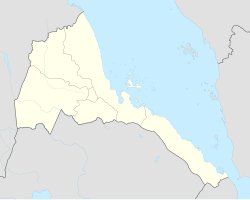Aseb
|
Assab ዓሰብ, ʿAsäb (in Tigrinya) عصب (in Arabic) |
|
|---|---|
| City | |
| Location in Eritrea | |
| Coordinates: 13°00′28″N 42°44′28″E / 13.00778°N 42.74111°E | |
| Country |
|
| Region | Southern Red Sea |
| District | Southern Denkalya |
| Elevation | 16 m (52 ft) |
| Population (2005) | |
| • Total | 20,222 |
| Climate | BWh |
Assab or Aseb (Tigrinya: ዓሰብ?, ʿAsäb; Arabic: عصب) is a port city in the Southern Red Sea Region of Eritrea. It is situated on the west coast of the Red Sea. Languages spoken in Assab are predominately Afar, Tigrinya, and Arabic.
Assab is known for its large market, beaches and nightlife. It is served by the Assab International Airport.
In 1989, Assab had a population of 39,600 inhabitants. It possessed an oil refinery, which was shut down in 1997 for economic reasons. Until 1998, Ethiopia used Assab as port to process 2/3rd of its trade with the world. Ever since and due to closed borders between Eritrea and Ethiopia, both the port and the port town lost most of their relevance. In 2005, an estimate placed the population of Assab at 20.222 inhabitants. In 2008, following a border dispute with neighbouring Djibouti and consequently an unsafe border between both parties, which saw forces from Qatar acting as mediators in a buffer zone, the role of Assab diminished further. Nearby is the site of the ancient city of Arsinoe.
Assab has the typical hot desert climate (Köppen climate classification BWh) of the Danakil Region. The city’s climate is arid and extremely hot, with an extremely low average annual rainfall of 40 mm (1.57 in). Assab experiences high temperatures during both the day and the night, with the annual mean average temperature approaching 31 °C (87.8 °F).
...
Wikipedia

